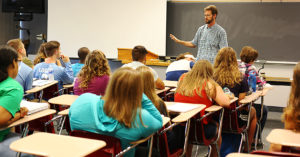Starting this fall, Houghton’s incoming first-year students will experience history in a whole new way.
Rather than rotating through the standard gamut of “first-year” courses—such as Western Civilization, Literary Voices, and Metaphysics, Morality, and Mind—incoming students will participate in a three-semester integrative studies course that fulfills requirements in history, literature, and philosophy. True to its name, the “Enduring Questions” course was designed to help students contextualize further studies and situate themselves within the wider Christian liberal arts tradition.
 The course was primarily designed to “get students to think about some of the questions that are important to us,” said Dr. Linda Mills-Woolsey, professor of English and former academic dean. The course’s scope is chronological rather than topical or thematic, progressing from the earliest histories of the ancient world to the literary masterpieces of the 20th century. “All things being equal, this kind of thing has worked very well,” Mills-Woolsey said in reference to the program.Yale University, for instance, has for several years required its first-year students to participate in a uniquely integrative “Directed Studies” program, which was created to guide them through the study of literature, philosophy, history, and political theory. Similar programs have thrived at other private colleges in recent years.
The course was primarily designed to “get students to think about some of the questions that are important to us,” said Dr. Linda Mills-Woolsey, professor of English and former academic dean. The course’s scope is chronological rather than topical or thematic, progressing from the earliest histories of the ancient world to the literary masterpieces of the 20th century. “All things being equal, this kind of thing has worked very well,” Mills-Woolsey said in reference to the program.Yale University, for instance, has for several years required its first-year students to participate in a uniquely integrative “Directed Studies” program, which was created to guide them through the study of literature, philosophy, history, and political theory. Similar programs have thrived at other private colleges in recent years.
In speaking about the course, Mills-Woolsey emphasized the importance of giving first-year students “a context, a picture they can plunge in-depth into later.” She elected to use a mixture of pedagogical practices in her teaching, from full-class Socratic discussions and short lectures to small group conversations focusing on specific attributes of the text. According to Dr. Peter Meilaender, each professor drafted their own unique syllabus, reading list, writing assignments, and exam materials based on the historical events and cultural milestones that they considered to be the most vital to a study of the Western cultural tradition.
“Many faculty,” Meilaender added with a smile, “have wondered how much history students actually remember.” By presenting historical events alongside the philosophical musings and literary works that influenced them, these professors hope to build a more cohesive—and comprehensive—contextual structure. Students work their way through readings from the book of Genesis, the Iliad and the Odyssey, the love poetry of Sappho, and the philosophy of Plato and Aristotle, among others.
“In some ways, though, it’s not completely new,” Mills-Woolsey said. “I’m teaching stuff that I would have taught in London.” Every faculty member who was hired to teach the course, with the exception of President Mullen, had previously spent a term teaching in the London Honors program. While Humanities 101 does not boast the same totally immersive experience as the overseas honors program—and also lacks its intense reading lists and writing requirements—it does mimic its integration of multiple connected disciplines.
Attempting a survey course so ambitious in scope must, of course, entail some logistical and organizational challenges. “It stretches the professors a little more,” said Mills-Woolsey, “because nobody is an expert.” However, many of the course’s professors have completed extensive study in multiple . Mills-Woolsey’s graduate studies examined literature within a historical context, while President Mullen attained degrees in both history and philosophy and Meilaender’s professional work has focused heavily on the intersection between political theory and literature. “When you’re a small faculty,” Meilaender said, “you have to do a lot of different things.” In this case, that might mean learning to teach across your discipline or illuminate the ties between Athenian philosophy and ancient military strategies.
“It’s a challenge trying to balance, to get [students] to be involved,” Meilaender said, while still ensuring that everyone in the class is “getting deep enough into the meat” of the material. How has the process gone so far? According to Meilaender, students “were actually pretty enthusiastic.” Mills-Woolsey also spoke highly of her students’ comments, calling them “very perceptive.” In the future, both hope that asking—and answering—these questions alongside students will open new doors for further study.
